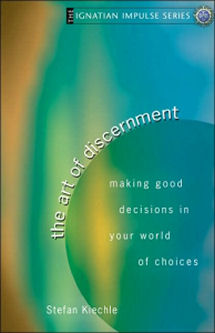
|
Posted July 28, 2005
Book: The Art of Discernment: Making Good Decisions in Your World of Choices Author: Stefan Kiechle Ave Maria Press, Notre Dame, IN, pp.121 An Excerpt from the Jacket:
In The Art of Discernment, author Stefan Kiechle offers a clear explanation of the discernment process first developed by Ignatius of Loyola and refined by his followers in the centuries since. This holistic process involves rationally outlining the pros and cons of a possibility, imaginatively considering what it would be like to live with the decision, listening to the movements of the heart, and prayerfully seeking the inner freedom to do what is best. An Excerpt from the Book: Iím not feeling well these days. Iím sleeping poorly. I feel like somebody has beaten me over the head, Iím restless and nervous. I often feel sad and depressed, discouraged, and at times desperate. Iím burying myself in work; I hardly ever meet friends anymore and do not feel like talking about my problems. I frequently feel lonesome and empty. There was a time when I was setting some quiet time aside for meditation every day. Now I can no longer find peace during that time, and most of the time I do not even take the time anymore. Personal crises often show up as physical symptoms: nervousness, sleeplessness, or digestive and intestinal problems. One may be able to suppress dark feelings of grief, rage, emptiness, desperation, or loneliness, but the physical signs will be unmistakable. Such crises also manifest themselves in disordered relationships. They cause tensions, resentment, belligerence, and withdrawal from people. They are often paralleled by a spiritual crisis: Prayers become dry and empty, meditations no longer appear meaningful, and one begins to lose interest in God who appears distant and unapproachable, perhaps even threatening or unjust. Ignatius calls this crisis ďspiritual desolation.Ē We frequently describe these symptoms of a crisis as physical and emotional restlessness. Psalms 42 and 43 express these feelings powerfully and prayerfully. The best advice Ignatius has for someone at this stage of a crisis is not to make a decision at such a time. Those who are not in touch with themselves, with others around them, or with God can be influenced all too easily by the evil spirit. Those who cannot communicate cannot listen, neither to good counselors nor to God. Despite all the misery crises create, it is helpful to remember that they are often normal and healthy. Through them, we grow and mature, even if we remain unaware of it for as long as we are enmeshed in a crisis. Anyone who is stuck in a crisis ought to focus on making an effort to get out of this state before he or she even considers making a decision. Only those with a well-disposed, joyful disposition full of consolation can acknowledge the reality of things accurately and correctly discern the spirits. In the presence of a good predisposition, one can decide in favor of good, positive things backed by sound motives. Lotso of things can help us escape a crisis Ė a treat, a vacation, or simply getting some distance from certain people while getting closer to others. Likewise good friends, prayer, and medical, therapeutic, or spiritual aid can make a big difference. Table of Contents: 1. Iíve got a problem 2. Ignatius of Loyola, our guide 3. The criteria for discernment 4. Methods of discernment 5. Difficulties during the discernment process 6. The ten guiding principles of discernment |
|
